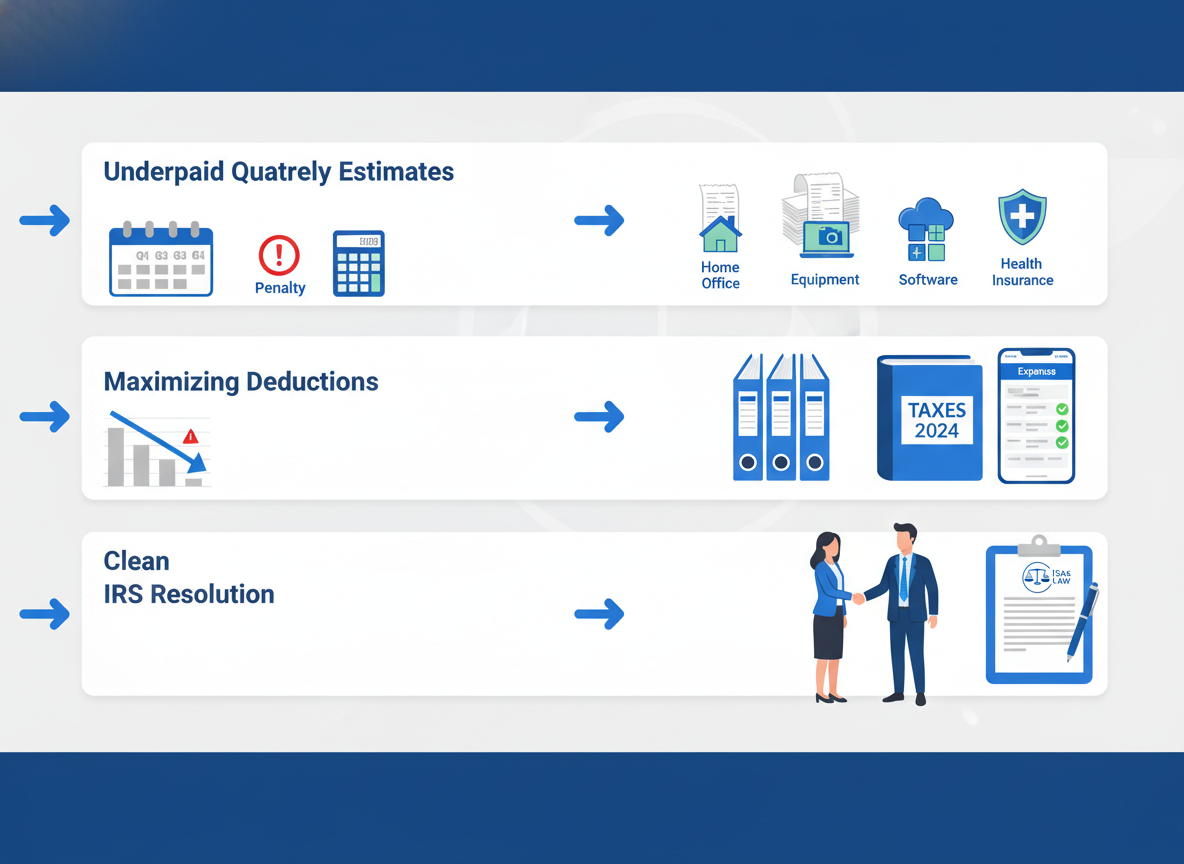Self-Employment Tax Problems: What You Need to Know

Look, if you're self-employed, there's a good chance you've had that moment where you sit down to do your taxes and suddenly realize you're in way deeper than you thought. Trust me, you're not alone. Self-employment tax problems are incredibly common, and they catch even the most organized entrepreneurs off guard. The good news? You don't have to navigate this maze alone, and honestly, you shouldn't try to.
Here's the thing that really gets people: when you work for yourself, you're not just paying the taxes you used to pay as an employee. You're actually covering both sides of the equation now. Remember when you had a regular job and saw those Social Security and Medicare deductions coming out of your paycheck? Well, your employer was matching those contributions behind the scenes. Now that you're the boss, you get to pay both portions yourself. It's called self-employment tax, and it sits on top of your regular income tax.
This double-whammy is where a lot of people get blindsided. You might think you're doing okay, setting aside money for taxes like you always have, but then April rolls around and suddenly you owe way more than expected. The self-employment tax rate is currently 15.3 percent, which covers 12.4 percent for Social Security and 2.9 percent for Medicare. That's a significant chunk of your income, and if you're not planning for it properly, it can absolutely wreck your finances. This is exactly where a tax attorney can step in and help you develop a realistic tax strategy from day one, so you're never caught off guard.
One of the biggest problems self-employed folks run into is underpaying their estimated taxes throughout the year. When you're an employee, taxes get withheld automatically from every paycheck. It's like you never even see that money, so it doesn't hurt as much. But when you're self-employed, nobody's withholding anything. You're supposed to make quarterly estimated tax payments to the IRS, and honestly, a lot of people either forget, underestimate what they owe, or just don't have the cash flow to make it happen.
The penalty for underpaying estimated taxes isn't devastating, but it's annoying and unnecessary. The IRS expects you to pay at least 90 percent of what you'll owe for the current year, or 100 percent of what you owed last year, whichever is smaller. If you don't hit those targets, you'll face penalties when you file your return. A tax attorney can calculate exactly what you should be paying each quarter based on your actual income patterns, eliminating the guesswork and helping you avoid those penalties altogether. Why worry about whether you're paying enough when someone can tell you precisely what you owe?
Another massive problem is overlooking deductions, and this is where people literally leave thousands of dollars on the table. When you're self-employed, you can deduct all sorts of business expenses from your income before calculating your taxes. We're talking about things like your home office, equipment, software subscriptions, professional development, travel, meals with clients, health insurance premiums, and even part of your self-employment tax itself. But here's the catch: the tax code is complicated, and what seems like an obvious deduction might not qualify, while expenses you never considered could actually save you a fortune.
A tax attorney knows the ins and outs of every deduction you're entitled to. They stay current on tax law changes, understand the nuances of what qualifies and what doesn't, and can structure your business activities to maximize your legitimate deductions. Instead of lying awake at night wondering if you're doing it right or leaving money on the table, you can have confidence that a professional is making sure you're taking advantage of every legal opportunity to reduce your tax burden.
Record-keeping is another area where self-employed individuals struggle. You need meticulous documentation throughout the year, not just a shoebox full of receipts in April. Every business expense needs to be tracked, categorized, and substantiated. Your income needs to be accurately recorded. If your finances are mixed with personal expenses, you've got a nightmare on your hands. A tax attorney can help you set up proper systems from the beginning, so you're never scrambling or second-guessing whether your records will hold up if the IRS comes calling.
And let's talk about what happens when things go wrong. Maybe you've already fallen behind on estimated payments. Maybe you've got a notice from the IRS about taxes you owe. Maybe you're facing penalties, or you've made mistakes on past returns that are keeping you up at night. These situations don't get better by ignoring them, and they're incredibly stressful to handle alone. A tax attorney can negotiate with the IRS on your behalf, set up payment plans, potentially reduce penalties, and protect your rights throughout the process. The relief of having someone in your corner who knows exactly how to deal with the IRS is invaluable.
Here's something most people don't realize: working with a tax attorney isn't just about fixing problems after they happen. It's about preventing them in the first place. When you have professional guidance, you're making informed decisions about your business structure, your quarterly payments, your deductions, and your overall tax strategy. You're not lying awake wondering if you're doing it right. You're not stressed every time an envelope from the IRS arrives. You're running your business with confidence, knowing the tax side of things is handled properly.
The bottom line is this: being self-employed is challenging enough without adding tax problems to the mix. You started your business to do what you love and build something meaningful, not to become a tax expert. Yes, you need to keep good records and stay organized, but you don't need to figure out the complexities of self-employment tax law on your own. A tax attorney can save you money, save you time, and save you an enormous amount of stress and worry. Instead of treating taxes as something you deal with once a year in a panic, you can have ongoing professional guidance that keeps you compliant, maximizes your deductions, and lets you focus on what you actually do best: running your business. Why struggle alone when expert help is available?
MARGOLIES LAW OFFICE
7920 Belt Line Rd #650
Dallas, TX 75254
Website: https://www.dallastaxattorney.com/

.webp)


%20-%20Copy.jpg)